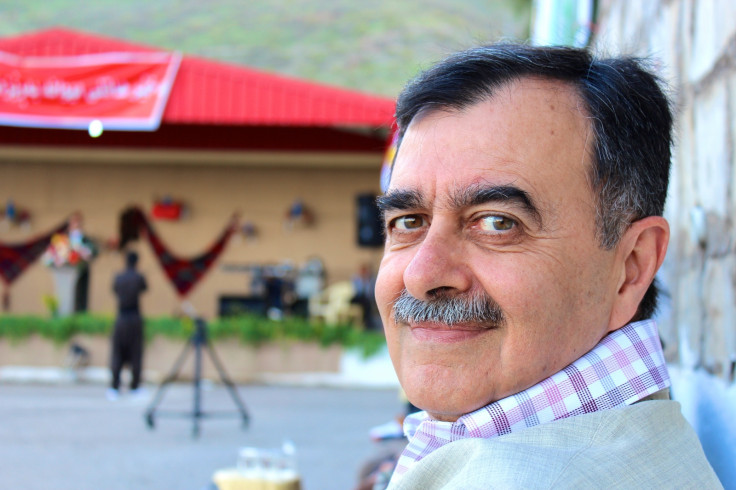Iran nuclear talks: Top Kurdish dissident warns Islamic regime 'are oppressors and liars'

Even in the swanky lobby of a five star hotel in London Victoria, Iranian Kurdish dissident Abdullah Mohtadi has to look over his shoulder. As secretary general of the Kurdish Komala party, he has not been able to return to his home in the north of Iran for three decades.
"I am one of the most wanted people in Iran. The Iranian regime has assassinated hundreds of people outside of their own country. I do not feel safe anywhere in the world," he told IBTimes UK during a brief visit to London from his home In Erbil, Iraqi Kurdistan.
Komala is one two main parties that represent between five and six million Kurds living in four Kurdish-majority provinces in Iran's North West. Kurds refer to this region as East Kurdistan, with the Kurdish areas of Iraq, Syria and Turkey known as South, West and North Kurdistan respectively.
'I do not think the Iranian regime are part of the solution, they are part of the problem.'
Only in Iraq and to a certain degree Syria do Kurds have any real political autonomy. Turkish and Iranian Kurdish parties are banned and Kurds suffer severe restrictions on their language, traditions and culture. Mohtadi said that in 2015 that repression in Iran is worse than ever.
"Kurdish NGOs are not allowed in [Iranian] Kurdistan. The situation is still very hard. They execute young people for protesting. [Iranian] Kurdistan is reaching boiling point," he said.
Komala has not engaged militarily with Iran for 18 years, says Mohtadi, as the Kurdish movement supports pro-democracy movements in the country rather than violence.
As a young man, Mohtadi took part in the revolution in 1979 which saw the overthrow of the Shah, but when Ayatollah Khomeini returned and established the Islamic theocracy that rules Iran to this day, he fled to the north of the country and then, in 1983, left Iran completely.
The Kurds supported the Green Movement that swept Iran in 2009-2010, but since it was violently put down by the government the situation for democratic Iranian parties – the Kurds included – has been increasingly dire. A new generation of Iranian Kurds is growing increasingly angry and looking to parties such as Komala to stand up for them.
'The international community forgets about the violations and the human rights abuses against its own people – especially against Kurds.'
As such, a return to violence could be inevitable, Mohtadi fears.
"It is especially unbearable for the young generation. They want us to do something. They are arresting and executing people just for celebrating Newroz [Kurdish New Year] – how long can you tolerate this?" he said.
As the West looks poised to sign a nuclear deal with Iran and bring Tehran in from 40 years of isolation, Mohtadi said that the international community has overlooked the negative affect Iran has on the entire Middle East region.
"We're not against a nuclear deal as such but we hope they don't make so many concessions to Iran that could embolden them in their domestic and regional policies. Look at the balance sheet of this regime: they have been ruling the country for 36 years. They have ruined the country and its economy and its reputation. They have turned Iran into a prison for women, for the young, and for ethnic groups," he said.
"The international community forgets about the violations and the human rights abuses against its own people – especially against Kurds."
Mohtadi believes that the perception of President Hassan Rouhani as a reformer is a myth, and points out that there have been more executions under the leader than under his anti-Western predecessor, Mahmoud Ahmadinejad.
Iranian Kurdish militias made headlines in recent weeks after they joined Iraqi Kurdish fighters in the fight to liberate Kirkuk from IS. Komala fighters were part of the operation, pitting them effectively on the same side as Iran, who were pushing north to combat IS in Tikrit.
'[Islamic State] is a terrorist group that is against everything that is dear to us.'
But Mohtadi said that the 60 Komala fighters currently on the front line in Kirkuk were defending Kurds, and said that Iranian Kurdish peshmerga would take no part in any operation to liberate non-Kurdish areas from IS – including Mosul, an IS stronghold since June 2014.
"They are a terrorist group that are against Kurds, against the Yazidis, against democracy, against everything that is dear to us," said Mohtadi.
He remains concerned about the role of Iranian-backed Shia militias and Iranian military commanders such as General Qassem Suleimani, the head of Iran's Revolutionary Guard, in the recent offensive to liberate Tikrit from Islamic State (IS).
"I do not think the Iranian regime are part of the solution, they are part of the problem. They should not be allowed to take part in any operation inside Iraq," he said.
As for President Barack Obama and Secretary of State John Kerry – who have staked the Obama administration's legacy on a deal with Iran – Mohtadi only has words of warning.
"Even if they sign a deal with the US, still lots of problems will remain. They are sponsoring terrorism, interfering in many countries in the region. They are destabilising the whole region. The West must not forget that they are oppressors and liars," he said.
© Copyright IBTimes 2025. All rights reserved.






















